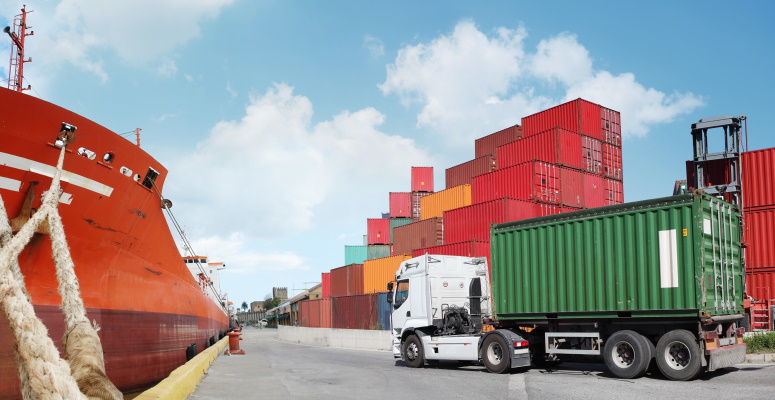
Month in Review – March 2024
Maritime
March 1: Cost of ‘Land Bridge’ Alternative to Panama Canal Too High for Carriers – The Loadstar
Liner operators say they are unlikely to emulate Maersk in using land transport to circumvent the Panama Canal restrictions, as moving containers by land in the Americas could drive costs up more than 30%.
In January, the Panama Canal Authority increased the number of daily transit slots to 24, despite first announcing a reduction to 18 for February. However, this is still fewer than the usual 36 daily transits through the waterway.
March 4: Empty Container Movements Increase by 20% – WorldCargo News
The demand for transporting empty containers has surged much more than the demand for transporting full ones, with back-haul trades expanding 2½ times faster.
By analyzing data sourced from Container Trade Statistics (CTS) on the movement of full containers between regions, it is evident that the expansion of empty container volumes, when compared with 2019 (excluding the significant fluctuations caused by the pandemic), has hovered around the 20% threshold over recent months.
March 6: Contracts: Shippers and Forwarders Wary of Usual 12-Month Deals – The Loadstar
The annual transpacific contract tender bartering season is in full swing at the S&P Global TPM24 conference and networking event in Long Beach, California.
The meeting rooms and halls of the vast venue are populated with formal, informal and sounding-out conversations on rates and routings for Asian container imports for the traditional May to April 12-month period.
However, this could be the year when the timeline of those contracts is reset – perhaps for good.
Indeed, ahead of those meetings, several shippers said they felt the lines were being unreasonable in their first rate increase requests.
And some indicated that they would look to sign for a shorter duration in order not to commit at too high a rate level for the second half of the year, when analysts are predicting rates will fall sharply against a background of the huge influx of newbuild tonnage.
March 11: Deadly Ship Attack Means Red Sea Voyages Need Rethink, Union Says – American Journal of Transportation
A major transport union urged a full halt of merchant ships sailing through the Red Sea, adding to calls for vessels to reconsider the voyages after a Houthi militant attack killed three sailors.
“We call on the industry to divert ships around the Cape of Good Hope until safe transit through the Red Sea can be guaranteed,” the International Transport Workers’ Federation said in a statement. “No delivery window is worth the loss of seafarers’ lives.”
The ITF lobbies for seafarer rights by acting alongside more than 700 affiliate trade unions. It followed a similar appeal by Nautilus International, one of the world’s largest crewing unions on March 7.
March 11: Finnish Port Workers Start Two-Week Strike, Anticipate Delays and Disruptions – WorldCargo News
The Central Organization of Finnish Trade Unions last week instructed its member unions to engage in industrial action following unsuccessful negotiations with the government regarding employee rights and social security.
Among the participating member unions is the Finnish Transport Workers’ Union, which predominantly represents workers in the stevedoring industry and has announced a port strike. The strike was scheduled to start on March 11 at 6 am and will continue until March 25 at 6 am.
Consequently, disruptions in operations are anticipated across all container ports, resulting in vessel loading and unloading delays.
March 12: Panama Canal Authority Adds Three More Daily Transit Slots – Splash
Solid amounts of rain have allowed the Panama Canal Authority (ACP) to add three extra slots per day at its panamax locks, taking the total daily maximum transits to 27, still more than 10 shy of the waterway’s normal maximum, but a sign that the worst is over from the record drought that has been plaguing the canal since June last year.
Two additional slots will be offered through auction for transit dates beginning March 18, and an additional slot will become available for transit dates beginning March 25.
March 14: Tribunal Rejects Montreal Port Employers’ Bid to Rule Dockworkers as Essential – CityNews Halifax
A federal tribunal on March 14 reiterated its stance that Montreal port employers cannot require employees to work during a strike, paving the way for negotiations to resume ahead of potential job action.
In a summary decision, the Canada Industrial Relations Board rejected a request by the Maritime Employers Association to deem port work an essential service in a bid to prevent a strike on the waterfront.
The employers and the union representing 2,100 port workers failed to secure a new collective agreement before it expired on Dec. 31, but the case was before the tribunal at that time, postponing possible labour action.
Explaining its ruling, the board cited a 2020 decision that the employers association failed to demonstrate “imminent and serious risks to the health and safety of the public” – the criteria for essential activity – in the event of a work stoppage.
March 15: Maersk CEO Says Container Rates Have Hit Unsustainable Levels – WorldCargo News
“Freight rates have fallen significantly since the good years of 2021 and 2022, and have fallen actually to an unsustainable level,” said Maersk CEO Vincent Clerc on March 14.
According to Clerc, further headwinds are emerging on the supply side, with an additional 11% of containership capacity expected to be added to the global fleet this year, followed by 7% more in 2025.
March 19: Local 514 Bargaining Update – BCMEA update
The BC Maritime Employers Association (BCMEA) and International Longshore and Warehouse Union Ship & Dock Foremen Local 514 have been engaged in negotiations with the assistance of conciliation officers from the Federal Mediation and Conciliation Services since January 19. In anticipation of the conclusion of the initial 60-day conciliation period on March 19, the parties have mutually agreed to a 30-day extension to conciliation.
This agreement extends the conciliation period to April 18. At the end of the conciliation period, the 21-day cooling-off period will begin (ending on May 9). Any further extension to the conciliation period can be made only by mutual consent of the parties. Accordingly, the parties have meeting dates scheduled in April.
March 19: Box Throughput Improves, but Delays Still Endemic at South African Ports – The Loadstar
Crane breakdowns and adverse weather are exacerbating delays at South Africa’s ports, despite a recent improvement in container throughput at its main gateways.
The South African logistics crisis has been escalating for years, and a lack of government investment into supply chain infrastructure has left the country’s ports, railways and roads extremely susceptible to disruption.
However, for the week ending March 15, the South African Association of Freight Forwarders reported that ports had handled an average of 8,838 containers a day, up significantly on the 7,755 handled the week before.
And state-owned port operator Transnet reported in its February figures that 23% more containers were handled than in January and 26% year on year.
March 22: Strike Paralyzing Finnish Ports Extended After Talks Collapse – The Loadstar
The two-week strike by Finnish transport workers that has effectively shut down the country’s ports is set to enter a third week, after union members voted to extend the action until April 1.
Around 7,000 workers across the transport, industrial and electrical sectors, and including the AKT transport workers union, have been on strike since March 11 in protest at proposed labour reforms by the Finnish government.
March 26: At Port of Montreal, Fewer Containers, Same Salary, Complains Employer – La Presse
More and more longshoremen at the Port of Montreal with job security are being paid even if they don’t “work” due to the drop in container volume, their employer complains. The Maritime Employers Association (MEA) blames this on the uncertainty of union bargaining and is asking a federal court to order a bargaining blitz.
The MEA is criticizing the Port of Montreal Longshoremen’s Union, which is affiliated with the Canadian Union of Public Employees (CUPE), in its application recently filed with the Canada Industrial Relations Board (CIRB). The employer accuses the union – which represents some 1,100 longshoremen – of showing “bad faith” by refusing to make itself available to negotiate.
After a series of meetings since last September, there have been no talks since January 16, the MEA points out. The employer accused the union of dragging things out, fueling instability and causing cargo to “flee from the Port of Montreal.”
March 27: Baltimore Bridge Collapse Impacts I-95 Shipping, Rail, Trucking and Port of Baltimore – American Journal of Transportation
The collapse on March 26 of the Francis Scott Key Bridge, after it was hit by a container ship, will disrupt shipping, rail, trucking, the Port of Baltimore and the Mid-Atlantic region served by the I-95 highway corridor, according to one shipping executive.
The executive said: “At this point, nobody knows how long the Port of Baltimore will be closed. It could be weeks, it could be longer. There are still containers in the water, and they have to be retrieved. There is still the damage assessment to the ship to be taken into account. There is also the environmental impact. Right now, we are scrambling to redirect our ships either to Norfolk or to New York/New Jersey and our concern is whether there is sufficient capacity to take the redeployments …”
The shipping executive went on to say: “In terms of the traffic, the loss of this bridge is huge: There’s a lot of vehicles that cross that bridge a day. There is also the impact on trucking and especially on hazmat cargoes that were transiting the bridge that may not use the tunnels. Rail, in and out of Baltimore, will be impacted, both the CSX and the Norfolk Southern.”
March 28: Finland Strikes Extended for Another Week, Port Disruptions Expected to Continue – WorldCargo News
The Executive Board of the Central Organisation of Finnish Trade Unions has extended its national program of political strikes for another week.
The extended strike began at 6:00 am on March 28 (coinciding with the anticipated conclusion of the current two-week strike) and will conclude at 6:00 am on April 8.
The Executive Board will reconvene this week to assess the situation and determine any further continuation of industrial action.
March 28: Cargo Companies Start to Reroute Away from Montreal amid Fears of Port Strike – Today’s Trucking
A major transport company has rerouted cargo away from the Port of Montreal over fears of a potential strike, prompting concerns that others may follow in its wake.
Delmar International, a Quebec-based logistics firm that counts 1,500 employees across 17 countries, said all Montreal-bound freight will now flow through the Port of Halifax in a pre-emptive move to curtail fallout from possible job action.
Association spokeswoman Isabelle Pelletier said employers are “very worried” about the consequences of mounting fears that a strike is looming.
“We have strong signals that cargo will be rerouted because of the uncertainty at the Port of Montreal,” she said in an email.
Air
March 5: Lufthansa Cargo Woes Continue as Ver.di Union Vows to Fight On – The Loadstar
Following repeated strikes at its hubs across Germany, Lufthansa is to engage in further negotiations with trade union ver.di.
Ground staff at Lufthansa Cargo have been striking intermittently since the start of the year, calling for a 12.5% increase on their basic salary, among other conditions.
The last round of negotiations between the German carrier and union were on February 21 and proved unsuccessful. The next round is set for March 13 and 14.
If the involved parties again fail to reach an agreement, the head of aircrew alliance at ver.di, Dennis Dacke, warned that ver.di is prepared to up the ante.
March 19: Exporters Nervous as Air Cargo Congestion Builds in Delhi and Mumbai – The Loadstar
Airlines are dealing with considerable cargo backlogs across major international airports in India as volumes spike, according to industry updates.
“The effect has been most [noticeable] at Delhi and Mumbai airports,” a source at Air India said.
The source also noted that ocean trade diversions, in the wake of lingering Red Sea-linked pain points along with the traditional peak season for air cargo during March and April, had caused the acute capacity overhang.
Rail
March 6: CN Committed to Milton Logistics Hub Despite Court Ruling – Progressive Railroading
After a Canadian federal court rejected the federal government’s approval of CN’s planned Milton Logistics Hub, the Class I reiterated its commitment to the $250 million project in the Greater Toronto Area.
The court recently ruled that the government failed to settle whether the CN facility will have a harmful impact on air quality and, by extension, human health. The court’s decision sets aside the approval issued by the federal government in January 2021 and sends it back for reconsideration.
Authorization to build the project was subject to Canada’s most extensive environmental review process, resulting in an approval that includes 325 conditions designed to protect both the community and the environment, CN officials said in a press release.
CN officials also said they’re still reviewing the decision. But they reiterated that the project is a critical piece of infrastructure in Canada’s busiest and fastest growing region, where new capacity is needed to meet the growing demand for goods.
Trucking
March 4: B.C. Container Truckers Will See Rate Increase in July – Today’s Trucking
The Office of the British Columbia Container Trucking Commissioner (OBCCTC) has increased the minimum rates for drivers that move drayage containers to and from the Vancouver ports and within the Lower Mainland.
As of July 1, 2024, independent owner-operators will see a 3.9% increase in wages, while company drivers will receive a minimum of $33.66 per hour.
The change applies to drivers with 2,340 hours of experience, while truckers with less than the required hours of experience will receive a $32.26 per hour rate until they reach 2,340 hours.
March 19: ‘Massive’ Rate Increase Needed to Finance Projected $1 Trillion U.S. Electric Trucking Conversion – Commercial Carrier Journal
Battery electric trucking is an almost $1 trillion proposition, and that doesn’t include the cost of acquisition for the actual trucks, according to a report released by the Clean Freight Coalition, an alliance of truck transportation stakeholders whose founding members include the American Trucking Associations and Truckload Carriers Association, among others.
The report was compiled by Roland Berger, an international management consultancy headquartered in Munich, Germany.
The group pegs full electrification of the U.S. medium- and heavy-commercial truck fleet at a cost of nearly $1 trillion in infrastructure investment alone: upwards of $620 billion from the trucking industry in chargers, site infrastructure and electric service upgrades, and $370 billion from utilities in upgrades to grid networks to meet the surge in demand of just commercial vehicles.
“An industry with a yearly turnover of about $800 billion and a profit margin around 5% cannot invest $620 billion without financial support or a significant increase in freight rates,” said Dr. Wilfried Aulbur, Roland Berger senior partner responsible for the firm’s global commercial vehicle, construction and agricultural business.
March 20: 5,000 Commercial Truck Parking Spaces Needed in Metro Vancouver – Daily Hive
There is a shortfall of 5,000 large parking spaces for oversized commercial trucks across Metro Vancouver, according to the Canadian Trucking Association of BC (CTABC).
This includes the need for 2,000 spaces within Surrey, where many of the region’s truck drivers reside, and where many logistics, warehouse-based and other types of traditional industrial businesses are located.
“The issue has been left unresolved for more than 20 years and the planners and politicians have never shown any real intention to resolve this issue. They need to get this issue resolved in partnership with the industry before it is too late,” said Amit Kumar, the president of the CTABC.
According to the City, a shortfall of available industrial lands in the region has created pressures in the trucking industry in Surrey and other areas within the South of Fraser. Without designated truck parking facilities, there have been growing issues with unpermitted truck parking lots, which create issues such as noise complaints, safety concerns and damage to roads not designed for heavy-duty trucks.
March 21: U.S. FMCSA to End MC Numbers, Overhaul Registration System to Stamp Out Fraud – Overdrive
The U.S. Federal Motor Carrier Safety Administration on March 21 admitted its system for motor carrier, broker and freight forwarder registration and updates has fallen behind and in part enables rampant fraud, while pledging to completely overhaul its verification processes and improve the “customer experience.”
The changes include ending MC numbers and using USDOT numbers as the sole identifier for carriers, brokers, forwarders and others, and also would require some work on the carriers’ part.
Much of the details of the change await finalization, and many will have to wait for a full rulemaking process to take place through publications in the Federal Register, where industry stakeholders can comment. Furthermore, FMCSA plans to hold an “industry stakeholder day” on May 29 to communicate the changes and gather feedback.
The changes are aimed mostly at security and fraud prevention.
March 29: U.S. EPA Announces New Strict Emissions Rule for Heavy Trucks – Commercial Carrier Journal
The U.S. Environmental Protection Agency on March 29 set strict emissions standards for heavy-duty trucks covering model years 2027 through 2032.
The new rules are somewhat more strict than those proposed last year. For example, motor carriers will have more time (2027-2030) to build out a zero-emissions infrastructure, but the flip-side is stronger emissions limits in 2031 and 2032. Under the final rule, roughly 30% of heavy-heavy-duty vocational trucks would need to be zero-emission by 2032 and 40% of regional day cabs.
The EPA Phase 3 rule does not specify any particular emissions solution in its rules, maintaining its promise of a “technology-neutral” approach. However, it will be difficult to hit emissions benchmarks without some integration of either hybrid, battery-electric or hydrogen-electric trucks.
CIFFA Advocacy, Communications, Activities
March 13: CIFFA Writes to Minister of Transport Ahead of Budget 2024
CIFFA wrote this week to Pablo Rodriguez, Canada’s Minister of Transport, to “emphasize the importance to our membership of adequate funding for the new Supply Chain office” in the coming budget.
The letter said, in part:
As you will recall, this new organization was one concrete action by your government in response to the disasters which befell Canada’s supply chain during the Covid pandemic and the floods in British Columbia.
The Budget of 2024 will be the first time your government can equip this Office with the resources it needs to have a positive impact, increasing the security and resiliency of our supply chains.
We also recognize that the government is consulting on the development of the National Transportation Supply Chain Strategy and opportunities for collaborative action, and we look forward to seeing the strategy outlined and in place, with concrete deliverables.
March 18: Executive Director’s Statement – Milton Logistics Hub: Oversight or Roadblock?
The year has started with a very upsetting development affecting supply chain fluidity. On March 1, the Federal Court of Canada ruled that it was blocking approval of the CN Logistics Hub planned for Milton, Ontario. Proposed in 2015, the $250-million investment would handle four trains a day, transferring cargo to approximately 800 trucks into or out of the rail yard.
The Federal Court’s decision is especially frustrating because the project had passed through a multi-year environmental assessment as requested by the Minister of Environment and Climate Change Canada. The Minister established 325 legally binding conditions, to protect the environment and human health, which would make this the most stringently regulated hub in North America, all of which were satisfied by CN.
After the licence was issued by the federal government, opponents sued to stop the project and the Federal Court did so, ruling that the assessment was flawed and failed to consider potential health risks relating to air pollution from the diesel fumes. Thankfully, CN has pledged to continue its attempts to develop the Hub.



